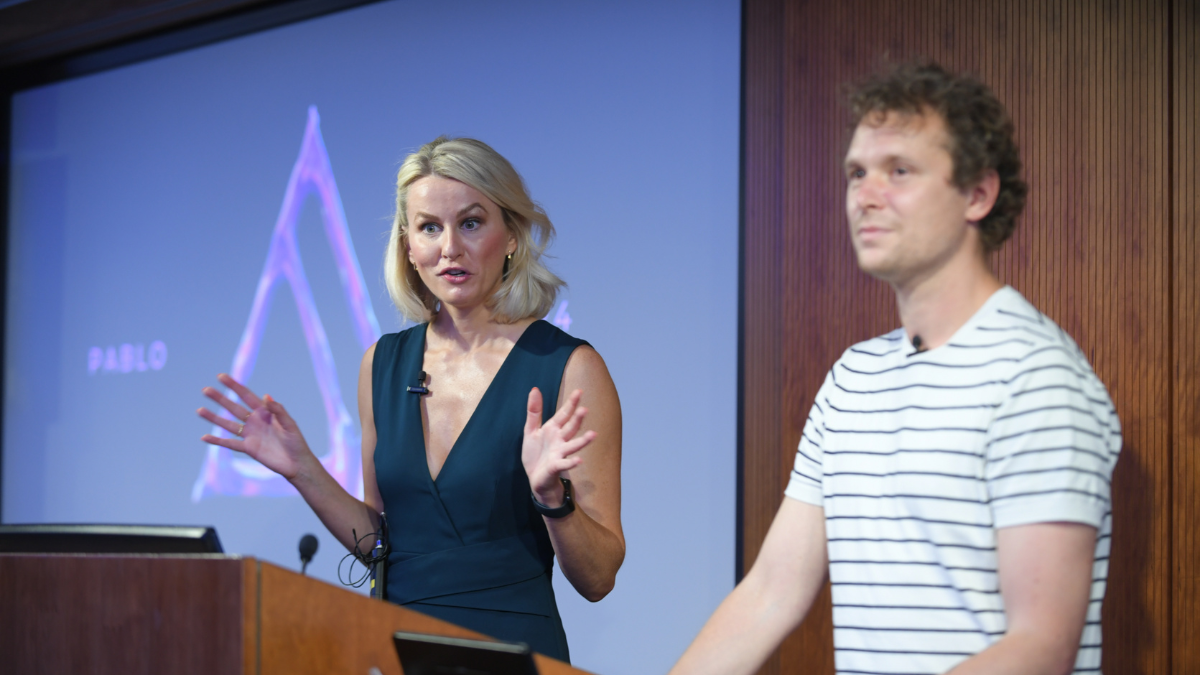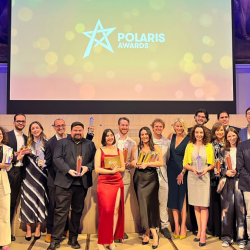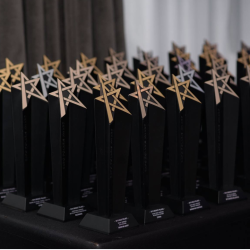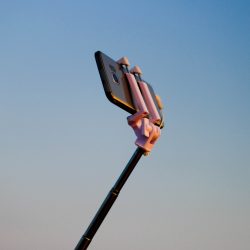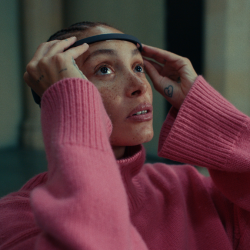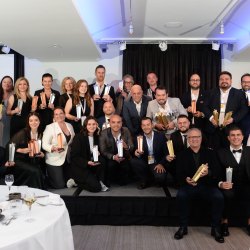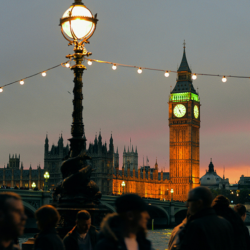On 21 June, Pablo’s Managing Director Harriet Knight and Planning Director Chris Turner spoke at the sixth edition of the Polaris Leadership Summit. During their session, they presented the Fake (Br)it Till You Make It campaign they developed for Visit Britain.
Known as ‘the world’s first interactive AI accent game’, Fake Brit earned Pablo a Gold Polaris Award in the ‘Gamification’ category.
MediaCat Magazine‘s Content & Social Media Editor, Svilena Keane, spoke to Harriet and Chris following their session at the Summit. They discussed the Fake Brit campaign, the Pablo Living Wage, and the agency’s recent introduction of shared parental leave.
Hi, Harriet and Chris. Could you introduce yourselves and what you do at Pablo?
Harriet: I’m Harriet Knight and I’m MD at Pablo. I run the day-to-day business, head up some of our key clients, including our government clients, and play a role with some of the other clients we have across our business ranging from DFS to Deliveroo to Costa Coffee.
Chris: I’m Chris Turner and I’m the Planning Director at Pablo London. I look after the strategy on some key clients such as DFS Betfair, Visit Britain, Dr Pepper, and whoever comes my way as well.
You work with a plethora of different clients, from government departments to world-renowned brands. Do you find it challenging working with both the public and private sector, considering their different needs?
Harriet: I love it. I get bored easily so to have the variety of one day working on selling toilet rolls to talking about behaviour change, trying to encourage tourists to visit the country, or working with NHS for blood and organ donations, keeps me on my toes. It’s forever interesting and you’re forever learning. No two days are the same; that’s one of the reasons I love this industry so much.
Oscillating between different types of clients, I find there’s a lot of transferable learning and a lot of what we do in the private sector is very useful when it comes to the public sector. You do have some key differences when you’re dealing with government clients, lots more stakeholders and a more complex network to navigate. Your role in terms of helping facilitate your clients with the information and the tools to be able to socialise the ideas and get it through an organisation, I think, is far, far greater.
Chris: There is definitely a rigour that comes with working in the public sector. I think you have to really be buttoned down at every juncture because every single decision you make, you have to make sure that there is something that’s backing it up because when it gets sold up through the chain to all the different stakeholders, you have to be able to stand by what you’re saying.
Harriet: I’d also say that when you’re dealing with taxpayers’ money, you are very responsible with any budget that you have, and often you’re dealing with much smaller budgets. Having some restrictions can actually be a bit of a blessing because it forces you to think even harder. You’ve got to try and find ways to do something that is going to be memorable and able to cut through. More often than not, you’re also dealing with some proper meaty subject matter that really matters, and means you can have an impact. I guess it’s slightly different sometimes when you’re trying to sell chocolate bars to people. It feels like you’re doing something which has a bit more of a legacy.
Your Fake Brit campaign for Visit Britain has certainly been memorable. How did the idea for the AI accent game come about?
Chris: Initially, we were thinking about the key associations with Britain and when we were discussing that with the creatives, the accent just kept on coming up. It’s something that a lot of people who have been to America have experienced firsthand. I think quite often they’ve been asked, ‘Where are you from? What’s that accent?’.
There was a study that the British accent is deemed the sexiest but it’s quite a narrow perception of what the actual accent is. What we wanted to do is widen out what that accent is and broaden people’s perspectives. The accent was the hook, but it was just our engaging way of talking about Britain as a country and a place to visit as well. As we were doing the research around the accent, we were starting to see that people were organically sharing videos about this already. There was this existing conversation that we just wanted to tap into to amplify and add to.
Harriet: One of the phrases Chris mentioned when we were doing the presentation at Polaris was ‘surfing, not splashing.’ There was a lot of talk going on online about accents and I think that was probably amplified by the exporting of reality TV shows like Geordie Shore and The Only Way is Essex. It would have been so easy to just make an advertising campaign, some great posters and some videos going, ‘We’ve got a sexy accent’. We wanted to do something a bit more tangible and more interactive that could involve people. We came across this brilliant production partner called the Mill Experience and we saw an opportunity to co-create a game, which could tap into speech AI and play with accents from across the UK and get Americans trying their hand at it. When you look at the results and see that 40% of people had an increased desire to visit places outside of London, it clearly worked.
There is a very standard perception of the UK. For a lot of people who live internationally, they think of the Queen, Big Ben, black cabs, and posh bumbling Brits like Hugh Grant. The UK is so much more diverse than just that, and more than London as well. I guess what we were trying to encourage is people to see a different side to the country and all the unexpected opportunities and experiences that you can have here.
Looking beyond campaigns, you have launched several initiatives to open pathways into the advertising industry. Can you talk about the Pablo Living Wage?
Harriet: We’re a great believer that actions speak louder than words and we’re a very active brand. At the beginning of the pandemic, we gave up our office space because we didn’t need it and we donated it to Rent to Shelter, a homeless charity, to help other people find a home.
In the last Euros, Christian Eriksen had a cardiac arrest on the pitch and was brought back to life with CPR from an off-duty doctor in the crowd. Even though CPR is a vital life-saving skill, it’s not taught at schools in the UK. When you look at countries where CPR is taught at a much younger age, the chance of survival goes up to something like 80%.
We wanted to try and find a way to get CPR into the hands of the nation more so we created a new range of CPR mannequin dummies. The current mannequin is modelled on a woman who was found in the Seine many decades ago and it isn’t something kids today really want to learn on. We created a new range with Connor Swindells and made a mannequin they’d actually want to save.
One of the things we’re really passionate about is opening up our industry. There’s probably two major crises happening at the moment: cost of living, and diversity and inclusion. It is a very middle-class industry right now and that needs to change.
Over the course of the last year, the industry saw the highest amount of churn that it has seen in a decade. We’re leaking people to other industries which are willing to pay a lot more money. The situation gets even worse with underrepresented talent, because unless you’ve got the bank of mum and dad to support you, it’s not a viable career option.
The average starting salary is around £24,000, which is a little more than I started on more than 15 years ago. One of the pillars of diversity and inclusion that often gets forgotten about is access.
So we made a commitment to raise the entry-level salary and introduced the Pablo Living Wage. We were already a real living wage employer, paying 26,000 per annum at entry level. We raised this to 30,000 — which affected about 8% of our staff — so that we could make this career not just brilliantly fulfilling but financially rewarding and an actual viable choice for people coming into the industry.
You’re also the first agency to introduce gender-neutral parental leave. Can you tell us a little bit about this?
Harriet: Yes, of course. Regardless of whether you’re a man or a woman, you now have exactly the same access to parental leave. We upgraded our parental leave for dads to be equivalent to what we were already offering women or mums. Previously, it was a month of paternity leave for a father. Now, depending on how long you’ve been at Pablo, your amount of access to parental leave goes up based on tenure at the company.
One of the biggest issues is the motherhood tax that happens when women get to a certain point in their careers and there’s concerns about them becoming flighty because they’re taking maternity leave. And when you look at take-up of shared parental leave, it’s less than 5% because dads aren’t given enough paternity leave in the first to make that a viable amount of time that they can share with their partner. So, we wanted to introduce a gender-neutral parental leave. We are the first agency to do that and I’m really pleased to see that other agencies have followed suit. Chris is actually one of the first fathers to benefit from the shared parental leave.
Chris: It’s totally game-changing. I took an initial four or five weeks to start with, and then towards the back end of this year, I’ve taken another two months. There are so many benefits to it, from just being able to spend time with my daughter, really seeing her develop, being able to interact with her, and building that true relationship.
I do think about all the fathers who’ve missed out on this opportunity that I guess is a privilege; it shouldn’t be a privilege, it shouldn’t really be ‘generous’. I think it should just be the norm and Pablo are spearheading that. It is a real shame that a lot of fathers have missed out on a lot of the moments that I’ve been able to witness with my daughter and build that fundamental relationship. I think the other thing that’s probably missing from this is discussion is the benefit that it’s given my partner as well, which is it is that sense of shared responsibility. Normally, what happens is that one parent has to look after the baby and then the other parent has to.
So if I was taking my time off, my other half would go back to work. And so all of a sudden, the responsibility is all on me. The fact that we were able to take that time off together and that’s what has created those core memories, that’s amazing.
What are your hopes for the future of the industry?
Harriet: I’d love to see our industry opening up more. I genuinely think it’s one of the best jobs on the planet. I think it should be one of the most diverse industries because you don’t need any formal qualifications or training to come into it. I’d love to see it being a career that is not only enjoyable but also financially rewarding.
Chris: When you see the makeup of the industry, you very quickly understand that we aren’t representative at all of that wider world. So, if we want to be better at our jobs, it’s mandatory to do this. If we can bring in more diverse talent and start to actually get people’s different experiences, I think that’s only going to lead to better work that better reflects the country that we live in.
This interview has been shortened for length.
Featured image: Harriet Knight and Chris Turner / Polaris Leadership Summit




















